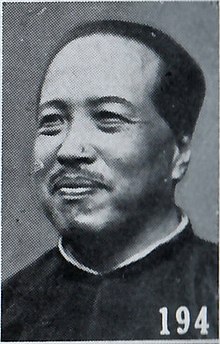Zhang Ji (Republic of China)
| Zhang Ji 張繼 | |
|---|---|
 |
|
| Born | 31 August 1882 Cangxian. Hebei |
| Died |
15 December 1947 (aged 65) Nanjing |
| Nationality |
|
| Other names | Zhang Puquan (Chinese: 張溥泉) |
| Occupation | Politician |
Zhang Ji (Chinese: 張繼; August 31, 1882 Cangxian, Hebei – December 15, 1947 Nanjing) was a revolutionist against the Qing dynasty and early Chinese anarchist who became a leading member of the right-wing in the Kuomintang (Chinese Nationalist Party).
After a classical education in China, Zhang went to Japan in 1899, where he studied at Waseda University. In 1900, he joined other Chinese students in Tokyo to form the anti-Manchu Qingnianhui (Youth society), and became friends with other revolutionists, Zhang Binglin and Zou Rong, and was attracted by Japanese radicals such as the journalist Shūsui Kōtoku. He was a contributor to Subao, the Shanghai journal which was a center of revolutionary activity and publication. When he went to Changsha, Hunan to teach, he also became a comrade of Huang Xing, another early revolutionary. In 1904 he published an influential essay, "Anarchism and the Spirit of the Anarchists." Inspired by his readings on the French Revolution and the spirit of Danton, Zhang defended terrorism and assassination:
In 1905 Zhang was forced to return to Japan with a price on his head. There he joined Sun Yat-sen's organization, Tongmenghui (Revolutionary Society) and was made editor of its journal, Minbao (People's journal). He ridiculed Sun's rival, Liang Qichao, calling him a "horse's fart." He and Liu Shipei were influenced by Japanese radicals and became the Tokyo counterpart to the Paris anarchists.
...
Wikipedia
